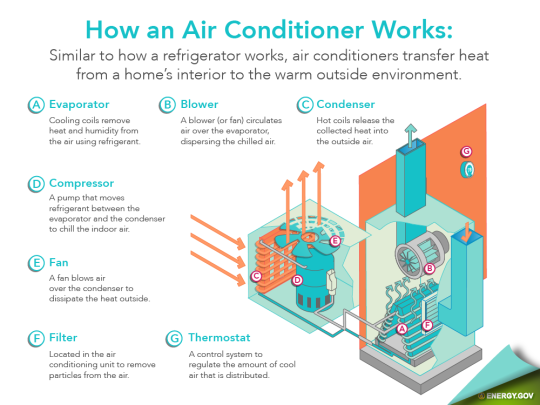Blogs
How Does AC Work?
8/27/2015

We’ve made it through the hottest portion of the year. School has started and, if you’ve kept your HVAC system well maintained, you didn’t even notice the hot weather throughout the day. Most of us don’t even really pay attention to the air conditioner or heating systems in our homes, at least until they break down. Once in a while, it’s good to recognize how these systems work so we can take better care of them and ensure that they last longer and work more efficiently. So how does an air conditioner work?
Basics of how air conditioning works
Air conditioners are very similar in construction to refrigerators. HVAC units work on the principle of heat transfer, by moving heat from the air and transferring it outside of the cooled environment. This is done using wonderful physics. When a liquid becomes a gas, it absorbs heat (a liquid can also be converted into a gas by adding heat).
Phase conversion, when a material changes from one state to another, is where this heat transference takes place.
Air conditioners take advantage of this process by changing the pressure of a refrigerant to force this state change. When the pressurized liquid returns to a gas state, it pulls heat from the warm air around it, leaving it much cooler than before.
Air conditioning process breakdown

How an Air Conditioner Works source: energy.gov
Starting with the evaporator:
- The refrigerant, in a liquid form, flows through the evaporator coils. While here, warm air sheds heat into the cooled liquid, turning it into a gas. This cooled air is cycled through the building with a blower fan, transferring warm air over the coils, and cool air into the room.
- The compressor takes this compressible gas and pumps it into a chamber where the pressure is increased (raising the temperature of the gas) before sending the high-pressure gas into the condenser coils.
- The condenser coil exposes the pipes containing refrigerant as a gas to the outside air, where they release trapped heat. A second fan moves air over the condenser coils to further dissipate heat.
- As the gas sheds heat to the outside air, it changes to a lower pressure line. The change in pressure triggers the phase conversion again to turn the refrigerant back into a liquid, where it returns to the evaporator coils.
While the mechanical components of an HVAC system are extremely complicated, the principle behind it is taught in basic science courses. Just remember, if there’s an issue with your HVAC system (it won’t cycle on, refuses to blow cold air, or continually freezes the condenser coils), you should call a certified technician. This simple set of physics uses a marvel of engineering to keep your home cool during the hottest months but contains some sensitive components and a refrigerant that needs to be handled properly. Stay safe, and stay cool.
Heating and Cooling Des Moines Since 1997
At Service Legends, we take pride in heating and cooling Des Moines and the surrounding areas. Our HVAC services include furnace and air conditioner installation, repairs, maintenance, and tune-ups. Our lineup of Indoor Air Quality solutions includes whole-home humidifiers, air purifiers, and air filtration systems. We can even help with HVAC financing.
Call 515-657-6634 to contact our Home Comfort Heroes today. We’re standing by 24/7.
515-657-6634Request Appointment Online
Return- January 2024
- October 2023
- September 2023
- August 2023
- January 2023
- December 2022
- November 2022
- October 2022
- September 2022
- August 2022
- July 2022
- June 2022
- May 2022
- April 2022
- March 2022
- February 2022
- January 2022
- May 2021
- November 2020
- October 2020
- September 2020
- July 2020
- June 2020
- May 2020
- March 2020
- February 2020
- December 2019
- November 2019
- September 2019
- May 2019
- April 2019
- January 2019
- December 2018
- November 2018
- October 2018
- July 2018
- October 2016
- September 2016
- August 2016
- July 2016
- June 2016
- May 2016
- April 2016
- March 2016
- February 2016
- January 2016
- December 2015
- November 2015
- October 2015
- September 2015
- August 2015
- July 2015
- June 2015
- May 2015
- April 2015
- March 2015
- February 2015
- January 2015
- December 2014
- November 2014
- October 2014
- September 2014
- August 2014
- July 2014
- May 2014
- March 2014
- February 2014
- January 2014
- December 2013
- November 2013
- October 2013
- September 2013